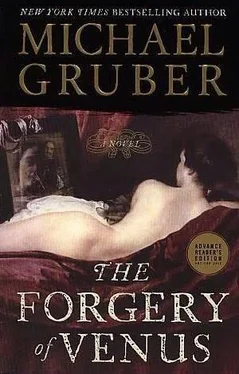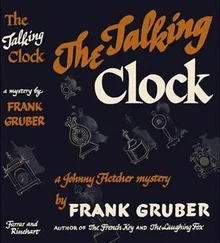I gave him a hard look, or what was meant to be one, but I knew there was no moral force behind it, and so did he.
The boat touched, bounced; the deck man leaped off and secured the prow to a cleat. I said, “Yeah, well, why the hell not?”
Mark grinned and clapped me on the shoulder. We walked into Venice like regular people.
Back at my hotel there was an envelope waiting for me containing instructions for my trip to Rome. Interesting. Were they so sure I would agree, or did Krebs have agents ready to deliver such instructions at a moment’s notice? I found I didn’t care and that I was not offended. So they had my number? So what? In any case, there was a private jet leaving in the morning. I would get on it with Franco, but until then I was free.
Then out of the hotel, walking aimlessly in the direction of San Zaccaria. Man, I was scared to death but full of incredible energy, it was like waking up in Oz, intensified color, little shivers on my skin. I passed the San Zaccaria vaporetto stop, where a boat waited; I wandered aboard and thought it might possibly be my very last trip ever on public transportation. We putt-putted around the lagoon and I got off at San Basilio in the Dorsoduro. I recalled Krebs talking about San Sebastiano, and I thought I’d drop in and take a look. The campo there in front of the church and the Scuola dei Carmini is one of the few places in Venice with any trees, pretty neat, but the Scuola building was closed. I waved a fifty-euro note in the guard’s face because I’m now one of the people who don’t ever have to wait. Inside there were walls and walls and walls of Giambattista Tiepolo’s work, which I liked but thought a bit too heavily influenced by that of Charles P. Wilmot, Jr.
Then I went to the church itself, which is entirely covered by Veronese paintings, except there’s one by Rubens, one of the very few Rubens paintings in Venice, Esther Before Ahasuerus. It was dark in there so I had to peer close, and then I noticed that the painting wasn’t a Rubens at all but a Titian, Danaë Receiving the Golden Rain, and for a strange transitory second I thought, Boy, this is a funny painting for a church, that splayed white body, luscious, and I am in El Escorial and I am caught up in a strange emotion…fear, a little, but mainly joy, elation. It is one of the best days of my life, as great almost as when I was made painter to His Majesty’s household, because next to me, listening respectfully to what I have to say, is Peter Paul Rubens, the greatest man in the whole world, save only His Majesty of Spain and the Pope.
He is telling me that I have to go to Italy, to see the classics and the great Italian painters, and although he is the most diplomatic of men, in fact a professional diplomat, still I am conscious of a tone, a suggestion that Madrid is not the center of the artistic universe, that being the painter to the king of Spain is perhaps not all that a painter can ask for, and I understand that yes, I must travel to Italy, and I begin to think how this can be arranged with the king, and with my lord the Count-Duke Olivares, who is my patron and besides has his hand on the purse.
So we talk about Titian some more and how he obtains his effects, how he can create motion out of controlling the eye of the viewer, and how this is done with color and composition, a technical problem that I wish to solve because he is suggesting that it is one thing I lack, that all Spanish painters of the present time lack: the figures are still, like tombstones; passion, yes, but not this Italian movement.
And then it’s later, or another day, and he’s copying one of His Majesty’s Titians and I’m watching him paint, he’s demonstrating something and just then one of the dwarfs comes trotting along, I can’t recall its name, an ugly squat thing, and when it sees us it begins to tumble and makes faces, and not wishing to be distracted I snap at the thing and tell it to be off. And it goes scuttling away.
Rubens pauses and watches the creature pass. I am surprised when he asks, “What do you think of your king?”
So I make the conventional response, or start to, but he shakes his head, and says, “No, Don Diego, I wish to hear not the courtier but the man. I know he’s been good to you and that you’re a loyal subject, but were Philip not king by God’s grace, then how would you judge him?”
I say, “As a painter he is not much,” and he laughs and says, “Nor as a king, I think. He is a fool, a decent man enough, but not a brain in his head. And your Olivares is as bad. All Europe knows it. You think not?”
He points to the painting he is copying, Titian’s Charles the Fifth on Horseback, and says, “When he ruled Spain, it was out of all question the mightiest realm upon earth, and now eighty years later you cannot beat the Dutch. Or the French, or the English. In that same time, you have brought from the Indies a mountain of gold and silver, a mountain! And gold and silver still land at Cádiz every year. Yet Castille and Aragon are among the poorest lands in Europe, miserable villages, miserable cities, miserable roads, rags and staring bones wherever you go. Flanders is rich, Holland is rich, England is rich, France is richest of all, yet Spain with all its gold is poor. How can this be?”
I say I don’t know, I am ignorant of such things, but also that the magnificence of the palaces in Madrid belies his accusation.
Rubens says, “Yes, gold enough for palaces, if barely. His Majesty still owes me five hundred reales, and I doubt I shall have it before I leave. Now listen to me, sir. You are a fine painter and may be a great one someday. As great as him, perhaps”-he gestures grandly with his brush at the Titian-“or me. I have never seen anyone paint as you do. I devise a painting in my mind, and think it out, and block it in, the bones of the piece, as it were, and perhaps I will do the faces, too, and let my people paint the rest. For as you know, I must earn my bread by my brush: I am not the painter to the king of Spain. But you, while you know little of composition and your figures are arranged anyhow and pressed together like a crowd in a tavern, still you have the gift of a living brush, the painting flies out of you like breath. But you must go to Italy, sir, Italy’s the place to learn how to build a painting. And soon, while the king still has enough to pay your way.”
And he laughed. We both laughed, although my laugh was a little forced.
“And another thing. You are a born painter and have made yourself a good courtier enough, but you will never make a diplomat, sir. It is your face, sir. While I was slighting your king and country just now, you had a look of murder on your face, and that is a look we diplomats can never wear. But you will do well; the king loves you, I have heard him say it. And I will say more, for I have known more kings than you, sir. They love us, yes, but they love us in the way they love their dwarfs and fools, like that little fellow just now, amusing for a moment and then got rid of with a kick and a curse. Never think otherwise, sir, however sweetly His Majesty praises you; they are none of them to be trusted.”
And now I am in a room brightly lit with candles, speaking with my lord the Count-Duke of Olivares, the king’s prime minister, about Italy, and he says they are sending General Spinola there, I can go with him. His Majesty will approve the voyage and will ask you to buy paintings for him, but for the love of God keep down the cost!
Then I am in a different place, walking down a narrow street, and everything is marble, old marble. Faces crumbled with time stare out of the architecture; there is a different smell and a different feel to the air, it is damp, and the women have a different look to them, bolder and more saucy, I think. I’m in Italy, in a crowded street, and I look around for my party, my servants, and there are some artists and officials of this city, I can’t recall which one, Modena, Naples…?
Читать дальше












